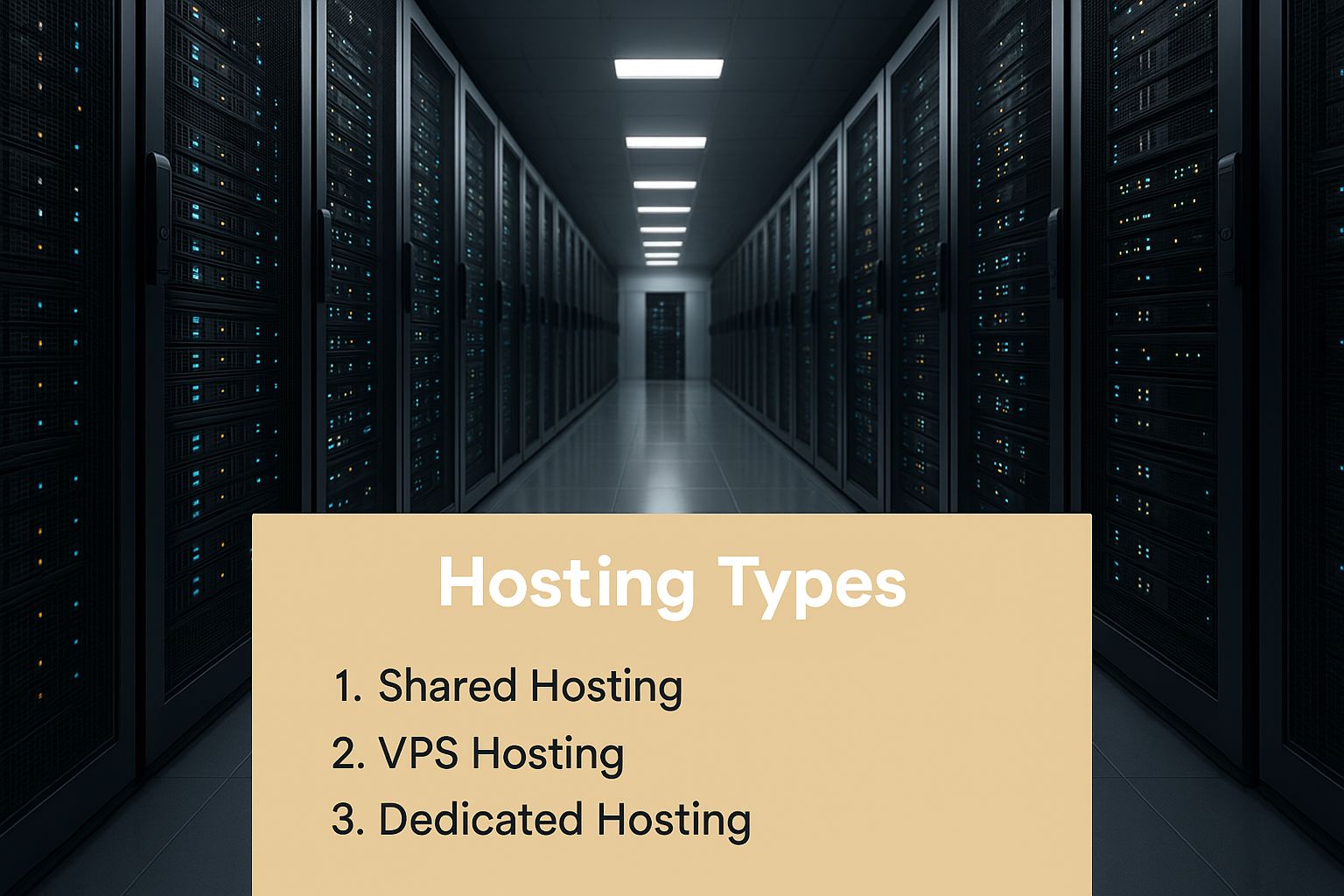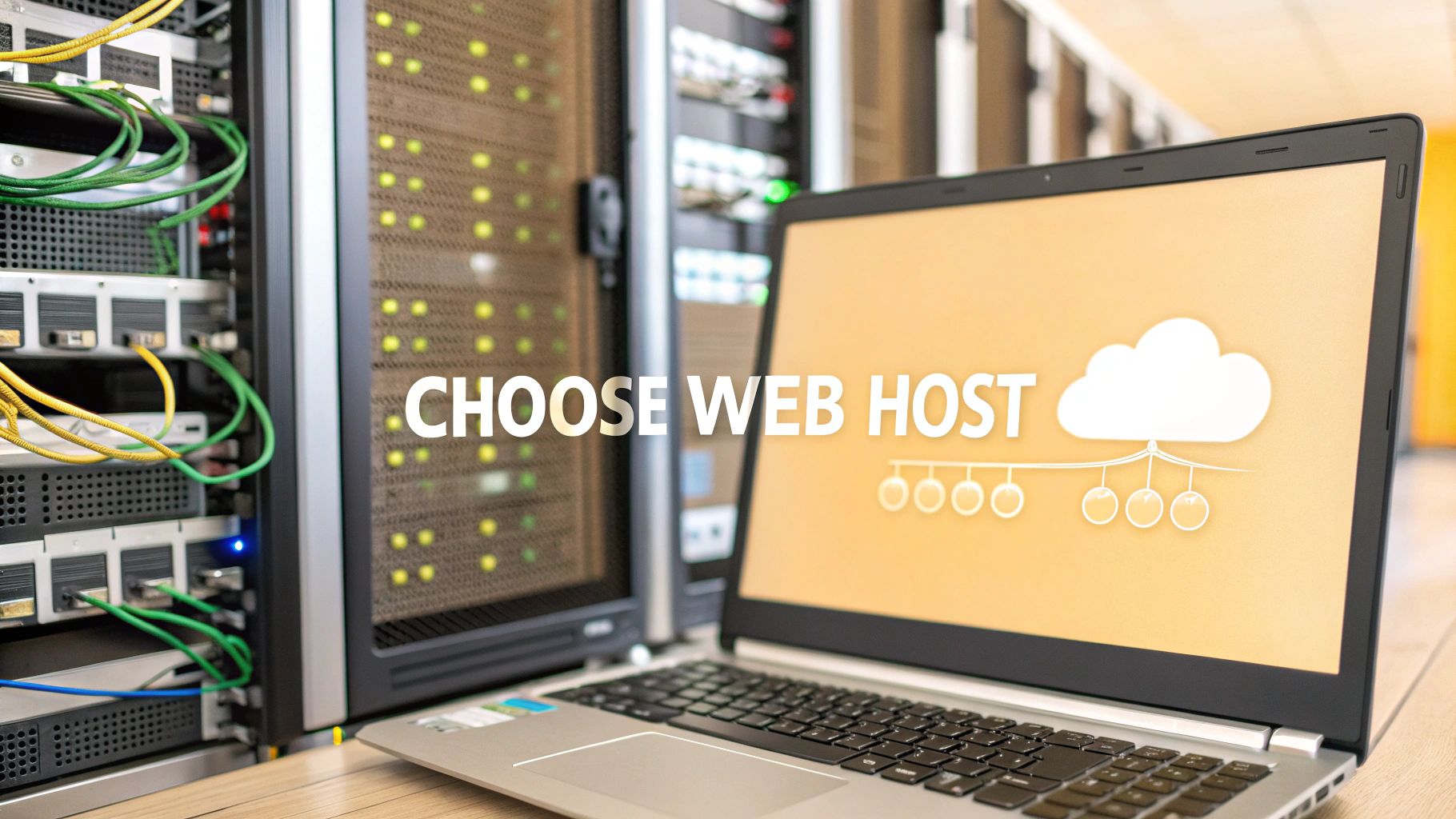Getting your web hosting right comes down to nailing four things: the hosting type, your performance needs, your budget, and the quality of technical support. A small personal blog can do just fine on cheap shared hosting, but if you're running a growing e-commerce store, you'll need something with more muscle, like a VPS or cloud hosting.
Why Your Web Host Is Your Most Important Decision
Think of your web host as the foundation of your house. You can have the most beautiful design and the best furniture, but if the foundation is cracked, the whole structure is at risk. It’s the same with your website. Choosing the wrong host can tank your site's speed, security, and uptime, which directly messes with your user experience and how you show up in search results.
Imagine you just launched a new online store. You’ve spent a ton on great product photos and a slick design, but your cheap hosting plan can’t keep up with the traffic. Potential customers show up, the pages take forever to load, and they just leave. It’s not a hypothetical—a study found that even a one-second delay in page load time can cause a 7% drop in conversions. That’s lost money, plain and simple, all because of a bad hosting choice.
The Real-World Impact of Hosting
The fallout from a bad hosting decision goes way beyond slow pages. I’ve seen these scenarios play out time and time again:
- Sudden Traffic Spikes: Your blog post goes viral. Awesome, right? Not if your shared server immediately crashes under the load, making your site totally inaccessible right when everyone wants to see it.
- Security Breaches: A host with flimsy security protocols is an open invitation for malware. A hack can destroy your brand's reputation in a matter of hours.
- Poor Customer Support: Your site goes down on a Saturday morning. You frantically try to get help, only to find out your host’s support team clocked out on Friday and won’t be back until Monday.
These aren't just edge cases; they're the everyday headaches for website owners who skimped on their hosting provider. The web hosting market is getting massive—it's projected to hit $159.9 billion by 2025. That means more competition and a bigger need to deliver a flawless experience just to keep up.
Your web host is your website's silent business partner. It’s working 24/7 to keep your digital storefront open, secure, and fast. Choosing the cheapest option is often the most expensive mistake you can make in the long run.
Ultimately, figuring out how to choose a web hosting service isn't just a technical task; it's a strategic business decision. For a much deeper dive into every little detail, this ultimate guide on how to choose website hosting is a great resource to check out.
Navigating the Different Types of Web Hosting
Jumping into web hosting can feel like learning a new language. You’re hit with terms like Shared, VPS, Dedicated, and Cloud, and it’s tough to know which one is the right fit. The key is to match the hosting type not just to your current website, but to where you plan on being in a year or two.
Think of it like real estate. Are you looking for a small apartment, a duplex with a yard, or an entire commercial building? Each serves a different purpose, and the same logic applies here. Picking the right one from the start saves you the massive headache of moving later.
This visual guide breaks down the essential differences between the main hosting types.

As you can see, each hosting solution offers a distinct balance of resources, control, and cost, designed for specific stages of a website's growth. Let's dig into what that actually means for you.
Which Hosting Type Fits Your Project?
Use this table to quickly compare the main hosting types and find the right solution based on your website's needs and your technical comfort level.
| Hosting Type | Best For | Typical Price Range | Technical Skill Required |
|---|---|---|---|
| Shared | New blogs, portfolios, small business sites with low traffic. | $2 - $15 / month | Beginner |
| VPS | Growing businesses, e-commerce stores, sites needing more control. | $20 - $80 / month | Intermediate |
| Dedicated | High-traffic sites, large enterprises, apps requiring max performance. | $80 - $300+ / month | Advanced |
| Cloud | Apps with variable traffic, large-scale projects, high-availability needs. | Varies (Pay-as-you-go) | Intermediate to Advanced |
Choosing the right starting point is crucial, but remember that you can always upgrade as your site grows.
Shared Hosting: Your First Digital Apartment
Shared hosting is the most common starting point for new websites. It’s incredibly affordable because you’re sharing a single server—and all its resources like CPU, RAM, and disk space—with hundreds or even thousands of other websites.
Imagine it as an apartment building. You have your own private unit (your website), but you share the building's utilities (server resources) with all the other tenants.
Shared hosting is perfect for:
- New personal blogs: If you're just starting to share your passion, this is all you need.
- Small business brochure sites: A simple site with a homepage, about page, and contact form doesn't require a lot of power.
- Portfolio websites: For showcasing your work without expecting massive traffic.
The major drawback is the "noisy neighbor" effect. If another site on your server suddenly gets a huge traffic spike, it can slow your site down, too. While it's a great launchpad, you'll eventually outgrow it. It's also important to remember that hosting is separate from the platform you use. Our guide comparing Wix vs Squarespace vs WordPress can give you more context on how these platforms connect with hosting.
VPS Hosting: The Upgrade to a Duplex
A Virtual Private Server, or VPS, is the logical next step up. While you still share a physical server with others, virtualization technology splits it into several separate, private server environments. You get your own dedicated slice of the server's resources.
Think of this as upgrading to a duplex. You share the same plot of land, but you have your own dedicated entrance, kitchen, and living space. Your neighbor's activities don't directly impact your home.
A VPS offers a sweet spot between the affordability of shared hosting and the power of a dedicated server. It gives you more control and guaranteed resources without the high price tag of going fully dedicated.
This option is ideal for a growing e-commerce store that needs to handle more traffic and process transactions reliably. It’s also great for developers who need root access to customize their server environment.
Dedicated and Cloud Hosting: The Commercial Buildings
Finally, we have the heavy hitters. A dedicated server is like owning the entire building—all resources are exclusively yours. This offers maximum performance, security, and control, but comes with a high cost and requires technical expertise to manage.
Cloud hosting, on the other hand, is like a flexible, modern commercial complex. Instead of one server, your site is hosted across a network of interconnected servers. If one server fails, another picks up the slack. This model offers incredible scalability—you can instantly scale resources up or down to handle traffic spikes, paying only for what you use.
What to Look for in Performance and Reliability
When you’re picking a web host, you’re not just renting server space—you’re making a bet on your website's performance and reliability. A slow or offline website is basically invisible to customers and a huge red flag for search engines. These performance metrics aren’t just tech jargon; they have a direct impact on your user experience and your bottom line.
Think of it this way: your host is the engine powering your website. A weak engine means sluggish acceleration and constant breakdowns, which will frustrate visitors and tank your reputation. But strong performance? That delivers a smooth, fast, and dependable experience for everyone who stops by.
Uptime Guarantees and What They Really Mean
You’ll see hosts throwing around promises of “99.9% uptime” all the time. It sounds nearly perfect, but the math can be a bit deceiving. A 99.9% uptime guarantee still allows for almost nine hours of downtime over a year. If you run an e-commerce store, nine hours offline could easily translate to thousands in lost sales.
Let's break down what those numbers actually mean in the real world:
- 99.9% uptime: Adds up to about 8.77 hours of downtime per year.
- 99.95% uptime: Cuts that down to 4.38 hours per year.
- 99.99% uptime: Allows for just 52.6 minutes of downtime annually.
You should aim for a host that offers at least a 99.95% uptime guarantee. But more importantly, dig into their service level agreement (SLA) to see what happens if they don't hit that number. Do they offer account credits or just an apology?
Key Hardware and Technology Features
The tech powering your host's servers is a massive deal. Old, clunky hardware will give you a slow website, no matter how much you optimize your own code. When you're trying to figure out how to choose a web hosting service, keep an eye out for these specific features.
Solid-State Drives (SSDs) are completely non-negotiable at this point. They blow traditional Hard Disk Drives (HDDs) out of the water in terms of speed, which means faster data access and quicker page loads for your visitors. Any host still pushing HDD-only plans is stuck in the past.
A Content Delivery Network (CDN) is another game-changer. A CDN works by storing cached copies of your site in data centers all over the world. When someone visits your site, the content gets delivered from the server closest to them, which drastically cuts down latency and boosts speed. Many of the best hosts integrate a CDN like Cloudflare for free.
Choosing a host is as much about the technology under the hood as it is about the price. SSDs, caching, and CDN integration are not luxury add-ons; they are essential components for a fast, modern website.
The big players in the cloud space get this. Amazon Web Services holds the biggest slice of the market at 31%, with Microsoft Azure and Google Cloud right behind. This shows that serious businesses prioritize rock-solid infrastructure for speed and reliability. Your choice of web host has a huge impact on your site's speed, which is a critical ranking factor. You can explore technical SEO best practices for startups to see how hosting fits into the bigger picture.
Finally, don't overlook caching. Caching saves copies of your site's files so the server doesn't have to rebuild every single page for every visitor. Good hosts offer built-in, server-side caching solutions that work right out of the box, giving you a performance boost with zero effort. If you want to go even deeper, check out these actionable website performance optimization tips that can work hand-in-hand with a great host.
Decoding Pricing Models and Hidden Fees
That shiny, low introductory price you see splashed across a web host's homepage can be hard to ignore. It’s the headline act, promising a powerful service for just a couple of bucks a month. But more often than not, this is a marketing hook designed to get you in the door before the real long-term costs come into focus.
The most common play in the book is the steep first-year discount that evaporates on renewal. You might sign up for a plan at $2.95 per month for your first term, only to find that rate balloons to $9.99 or more when it's time to renew. When you're trying to figure out how to choose a web hosting service, always hunt down the renewal rate, not just the flashy promo price.
This strategy banks on the fact that moving a website is a hassle. Most people will just swallow the higher price to avoid the headache of migrating. The only way to get a clear picture is to do the math and calculate the total cost over a two or three-year period.

Uncovering Common Hidden Costs
Beyond the sticker shock at renewal time, many budget hosting plans are littered with pricey add-ons—things that are actually essential for running a modern website. What starts as a bargain can get expensive fast once you start tacking on the features you genuinely need.
Keep an eye out for these common upsells during the checkout marathon:
- SSL Certificates: Most reputable hosts now offer free SSL through Let's Encrypt, but some budget providers still try to charge an annual fee for this. An SSL certificate is non-negotiable for security and SEO, period.
- Automated Backups: Your host should be backing up your site automatically and regularly. Some providers charge extra for this critical service or make restoring a backup a nightmare without a paid upgrade.
- Domain Privacy Protection: This is what hides your personal info (name, address, email) from the public WHOIS database. It’s a vital privacy tool that can tack on an extra $10-$20 per year.
- Professional Email Accounts: An email like
yourname@yourdomain.comjust looks more legit than a generic Gmail address. Many hosts will give you one or two for free but will charge you for any additional accounts you need.
The advertised price is almost never the final price. Always click through to the final checkout screen to see the full total, including taxes, fees, and any "recommended" add-ons that were conveniently pre-selected for you.
Calculating the Total Cost of Ownership (TCO) is the only way to make a smart call. Add up the initial term, the renewal cost for at least one more term, and the price of any add-ons you can't live without. A slightly more expensive plan that includes everything upfront is often a much better deal than a cheap plan that nickels and dimes you for every little thing. This bit of foresight will help you land a plan that actually fits your budget without any nasty surprises later on.
Why Security and Support Are Non-Negotiable
Speed and uptime get all the attention when you're picking a web host, but they're only half the story. The other half—security and support—is your safety net. When your site throws a bizarre error at 3 AM or you get a ping about a suspicious login, the quality of your host's support team suddenly becomes the most important thing in the world.
Think of it like this: fast servers are the engine of your car, but security and support are the seatbelts and airbags. You hope you never need them, but you absolutely can't drive without them. A great hosting provider doesn't just rent you server space; it actively protects your digital assets and has your back when things inevitably go wrong.
Essential Security Features to Demand
Your host is your first line of defense against a constant barrage of online threats. A single breach can destroy years of credibility, so cutting corners here is not an option. A proactive host provides a whole suite of security tools not as pricey add-ons, but as standard features baked into their plans.
Here are the non-negotiables you should look for:
- Free SSL Certificates: An SSL certificate encrypts the connection between your site and your visitors. It’s absolutely essential for security, trust, and even SEO. In 2024, there's no excuse for a host to charge for this.
- Automated Malware Scanning: Good hosts don't wait for you to find a problem. Proactive, automated scanning runs in the background to catch malicious code before it can do serious damage.
- DDoS Protection: Distributed Denial of Service (DDoS) attacks are designed to knock your site offline by flooding it with junk traffic. Your host needs to have systems in place to absorb and deflect these attacks automatically.
- Regular Backups: Things break. Files get corrupted. Mistakes happen. Your host should offer automated, daily backups and a simple way to restore your entire site with a single click if disaster strikes.
For a deeper dive, our guide on web application security best practices covers more ground on how to properly protect your online assets.
Vetting a Provider's Customer Support
Technical support can make or break your hosting experience. Bad support means long ticket queues, copy-pasted answers from a script, and sky-high frustration. Great support, on the other hand, is a true partnership that saves you time, money, and a ton of stress.
So how do you test it before you commit?
Don't just take their word for it—put them on the spot. Before signing up, open a live chat window and ask a few moderately technical questions. Ask about their specific server-side caching mechanisms or their policy on increasing PHP memory limits. How quickly they respond and the quality of their answer will tell you everything you need to know about what to expect when you're a paying customer.
"I once had a client's site go down during a major product launch. Their budget host's support took six hours to respond with a generic, unhelpful article. We switched hosts the next day. Never underestimate the value of instant, expert support."
Reading recent, independent reviews is also a great way to gauge support quality. This is especially true when you consider the market dynamics. North America is on track to command about 39% of the global web hosting market by 2025, and the U.S. alone is expected to generate $57.74 billion in 2024. With so many providers fighting for your business, exceptional support is one of the few things that truly sets the great ones apart. Learn more about these web hosting market trends to see just how competitive the environment is.
Common Web Hosting Questions Answered
Even after you've done all the research, a few nagging questions always seem to pop up right before you pull the trigger on a new host. These are the little details that can cause that last-minute hesitation. Let's clear them up right now so you can move forward with confidence.
Think of this as the final check-in before you commit.

Do I Need Web Hosting if I Bought a Domain Name?
Yes, you absolutely do. This is a classic mix-up, but the difference is pretty simple.
Your domain name is just your website's address on the internet (like www.yoursite.com). The web hosting is the actual property and building where all your website's files, images, and content are stored.
The domain just tells visitors where to go. Without hosting, there's no destination for it to point to. You need both to get a website live.
What is the Difference Between Storage and Bandwidth?
Let's use a retail store analogy.
Storage is the size of your stockroom. It's the total amount of digital space all your website files—images, videos, text, code—take up on the server. A big e-commerce site with thousands of product photos needs a lot more storage than a simple one-page portfolio.
Bandwidth is like the number of people who can walk through your front door each month. It's the amount of data transferred from your website to your visitors. Every time someone loads a page, they use a little bit of bandwidth. If your site gets tons of traffic, you'll burn through bandwidth much faster.
Can I Move My Website to a New Host Later?
Of course. You're never locked in forever. The process is called a website migration, and it's something people do all the time when they outgrow their current host or find a better deal.
In fact, many hosting companies will handle the move for you, sometimes even for free, to win your business. They have teams that do this all day, every day.
But a word of caution: a botched migration can be a nightmare, leading to downtime, lost data, or broken links. It's not always a simple copy-and-paste job.
While switching hosts is always an option, it's far easier and less stressful to choose the right web hosting service from the start. A good initial decision saves you the future headache and potential risk of a complex move.
How Does My Choice of Web Host Affect SEO?
More than you might think. Your web host is the foundation of your website's performance, and search engines like Google care a lot about user experience.
Here are the three big ways your host impacts SEO:
- Site Speed: Google uses page speed as a direct ranking factor. A slow host means a slow site, which can absolutely tank your search rankings and frustrate visitors.
- Uptime: If your website is constantly going down, search engine crawlers can't access it. This signals unreliability to Google, and users will just leave. Consistent uptime is non-negotiable for good SEO.
- Security: A good host will provide a free SSL certificate to enable HTTPS (the little lock icon in the browser). Security is a confirmed ranking signal, and browsers will actively warn users away from insecure sites.
Choosing the right host is the first step, but building a powerful online presence is a long-term project. At Up North Media, we specialize in creating custom web applications and data-driven SEO strategies that drive real growth. Let's build something great together. Schedule your free consultation today!
